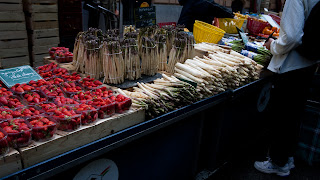The citizens of France have so much to teach North Americans about food, the joy of eating excellent food, devoting a high percentage of your income to quality food, spending hours over a leisurely meal while savouring food and conversation, the excellence of simplicity when using the best ingredients . . . .
I would imagine that if we could return to most French cities 300 years from now, we would find open air markets still operating on the same mornings throughout the week as they did centuries ago. This is a European tradition which grew as town life increasingly detracted city dwellers from planting their own vegetables and raising their own meat. Strict rules and regulations govern the precise locations and times when each market operates, and the city prepares the space and cleans up afterward.
Almost magically, vendors descend with their trucks laden with tables, aprons for the tables, scales, cash registers, signs with prices, transparent plastic bags for the more delicate perishables, and box upon box of fresh items purchased from importers and distribution centers just hours earlier. Tents are sometimes erected and everything happens quickly. Some markets are operating by 7:00 a.m. and nearly all are packed up and gone by 1:00 p.m. At most, an open air market would be open three days a week at a given location, but sometimes only twice or even once if drawing customers primarily from the countryside and other smaller villages.
I really enjoy these marchés. Having insufficient courage, I tend to stroll around with my camera held waist high, shooting without really knowing what I am getting. This seems to disturb customers and vendors far less than when I hold my SLR to my eye, frame and shoot.
On this chilly Saturday in mid May, I was really intending to visit the cathedral, but on the way I paused to see this flower vendor setting up under tents on a narrow triangular corner which featured Toulouse's version of the flatiron building. The road sign points the way to the Place Victor Hugo, which has the largest market in this capital city. However, I went instead to a smaller market which was obviously servicing the local neighbourhood.
I first noticed people carrying the sort of bags one gets at these markets, so I walked over to see where the action was. It was about 11:30 a.m. when things were in full swing and folks were shopping quickly before vendors started to think about finishing.
Tables were laden with fruits, winter root vegetables and a few tables (shown later) featured the season's very first gariguettes, the first strawberries available from French farmers. In my opinion, they are also the best, by far.
People don't just shop, they also pause for conversation, laughter and stories. Customers obviously frequent the same vendors week after week and develop friendships.
I wish I knew the source of these tomatoes, possibly Morocco, Algeria, Spain, hothouses in Provence?
The oranges looked superb, possibly because of the bright spring light, but they were also plump and juicy.
This vendor is testing the relative ripeness of the avocados for her customers.
These men talked for some time, clearly enjoying themselves.
White asparagus was just starting to appear, a delicacy created by continually mounding the soil to keep light away from the stalks, making them unbelievably tender. To the left we see the Gariguettes, my favourite strawberries, period. Each region has its own traditions. In Toulouse, vendors supply customers brightly coloured round plastic baskets they can use when selecting their own produce. It is assumed that you bring your own bags. There is certainly no room for North America's large four-wheel grocery carts!
Some vendors have trucks/trailers which can open, becoming refrigerated cases for meat or cheeses. Sausages hang from the metal ceilings. Meat throughout France is excellent, their standards are very high.
Baked desserts are also available. A large ring of coffee cake can be sold in portions, as much as you wish for the evening's meal.
This vendor's truck offers a wide variety of French cheeses, nearly all of which are more or less local to that particular district. To find cheese from other countries, you have to go to specialty import shops. But these people know their cheeses, sometimes asking when you will be eating it--today, or tomorrow. It makes a difference.
Eggs are generally not refrigerated. They sell quickly and are fresh to begin with, unlike eggs available in our North American supermarkets (which are 'super' only in quantity and price but almost never in true quality).
Every neighbourhood must, by law, have a bakery open within reasonable walking distance every day of the week. Even so, some specialty bakers make a business of selling more unusual traditional and non-traditional breads either made in special ways or having whole grains. Local bakeries are increasingly moving in this direction as well. The traditional white-flour baguette is still available everywhere, but most shelf space in bakeries is now devoted to other breads which are becoming very popular with the health-conscious French .
I also like to look behind the scenes in some open air markets, seeing how much produce has been brought, how well things are selling (which cases are empty). People continually clean up as the brisk sales continue. At the close of each market, large motorized street cleaners go through and wash down the sidewalks and streets, all cartons are tossed into large garbage trucks, and once the sidewalks dry, you would never know anybody had been selling anything there.































